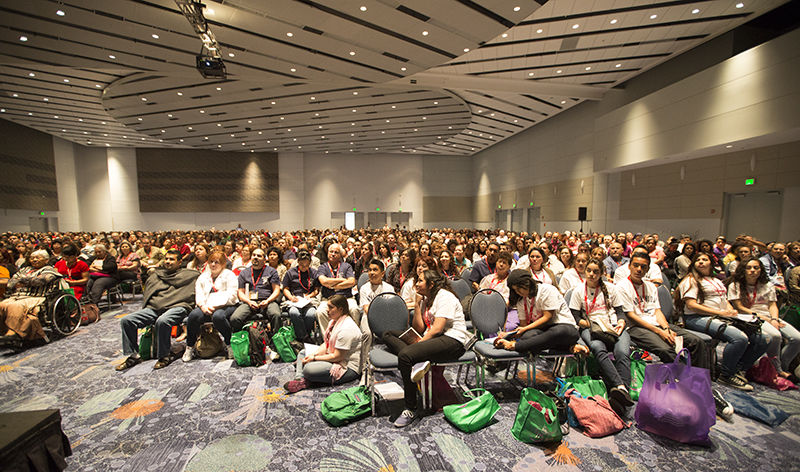I am tickled pink to be giving a talk at this year’s Religious Education Congress (Feb. 26-28) on “The Vocation of the Catholic Writer.”
As you may know, the Congress is a lollapalooza of an affair that takes place each early spring at the Anaheim Convention Center. The place is crawling with Catholic publishers, editors, priests, nuns and layfolk shopping for rosaries, Jesus tchotchkes and a chance to hear such luminaries as Father Ron Rolheiser, Auxiliary Bishop Robert E. Barron and Sister Helen Prejean dispense their wisdom.
It is no place for an introvert and just navigating the parking structure makes me want to lie down for four or five hours.
It is also a huge honor. I’m devoting a certain amount of time to working up my remarks, and again and again I circle back to this column, which, if you must know, is kind of the joy of my life.
I’m circling back as well to Brenda Ueland’s splendid “If You Want to Write: A book about Art, Independence and the Spirit.” I don’t know if Brenda was Catholic, but she was imbued with the spirit of Christ:
Everybody is original, if he tells the truth, if he speaks from himself. But it must be from his true self and not from the self he thinks he should be.
The only way to love a person is not, in the stereotyped Christian notion is, to coddle them and bring them soup when they are sick, but by listening to them and seeing and believing in the god, the poet, in them. For by doing this, you keep the god and the poet alive and make it flourish.
I hate orthodox criticism. I don’t mean great criticism, like that of Matthew Arnold and others, but the usual small niggling, fussy-mussy criticism, which thinks it can improve people by telling them where they are wrong, and results only in putting them in straitjackets of hesitancy and self-consciousness, and weazening all vision and bravery.
When I was a staff writer on a magazine several years ago, and set to work on an article, I would write laboriously (and with what ennui! what struggle to pin my attention on it!) 10 or 12 pages. I would realize then that I had just described very elaborately, and with a great deal of rewriting and polishing, something that everybody knew already.
With a sigh and as if throwing off a great weight, I would say to myself angrily: ‘What in thunder do you want to say? That women are too fat,’ my true self answered immediately and in a flash. ‘Well, put that down,’ I said to myself. And so I did, and it was right.
This has come in very handy as a “Catholic” writer. I have often spent hours working up a boringly grim jeremiad against a person, thought or way of being, then realized what I’m really trying to say is “I need to have my oil changed” or (inevitably) “I’m afraid no one loves me.”
The wonder of turning out an arts-and-culture column each week for me is that I have no professional training in dance, theater, literature, photography, architecture or painting. I have curiosity, imagination and a sense of humor. And I delight just deeply enough in the knowledge that the emperor often has no clothes, and am just willing enough to make a fool of myself, to have been drawn here to a wide variety of subjects.
A second wonder — and may every writer be so lucky, so graced — is to have happened upon an editor who, far from weazening all vision and bravery, has encouraged it.
Such has been The Tidings editor-in-chief J.D. Long-Garcia, who has given me a chance, a forum and carte blanche to write on subjects as diverse as ultra-marathoner Geoff Cordner, Grant Gershon, director of the Los Angeles Master Chorale and my own brother Geordie, a commercial fisherman in Gloucester, Massachusetts. I’ve done columns on the Rose Bowl Flea Market, the secret staircases of Silver Lake and the assemblage boxes of the reclusive Joseph Cornell.
To be imbued with a sense of mystery, excitement, possibility; to search ceaselessly for order, beauty, truth; to see the god and the poet in one another. Is this not what it means, in the deepest sense, to be Catholic?
That the archdiocese — within whose embrace I was confirmed and took my First Communion — allows me to serve her in this way is a sacred trust I keep very close to my heart.
As Brenda Ueland observed, “Writing is not a performance, but a generosity.”
And as the great Flannery O’Connor noted in a 1957 essay entitled “The Church and the Fiction Writer”: “The Catholic writer, in so far as he has the mind of the Church, will feel life from the standpoint of the central Christian mystery — that it has, for all its horror, been found by God to be worth dying for.”
Heather King is a blogger, speaker and the author of several books.

